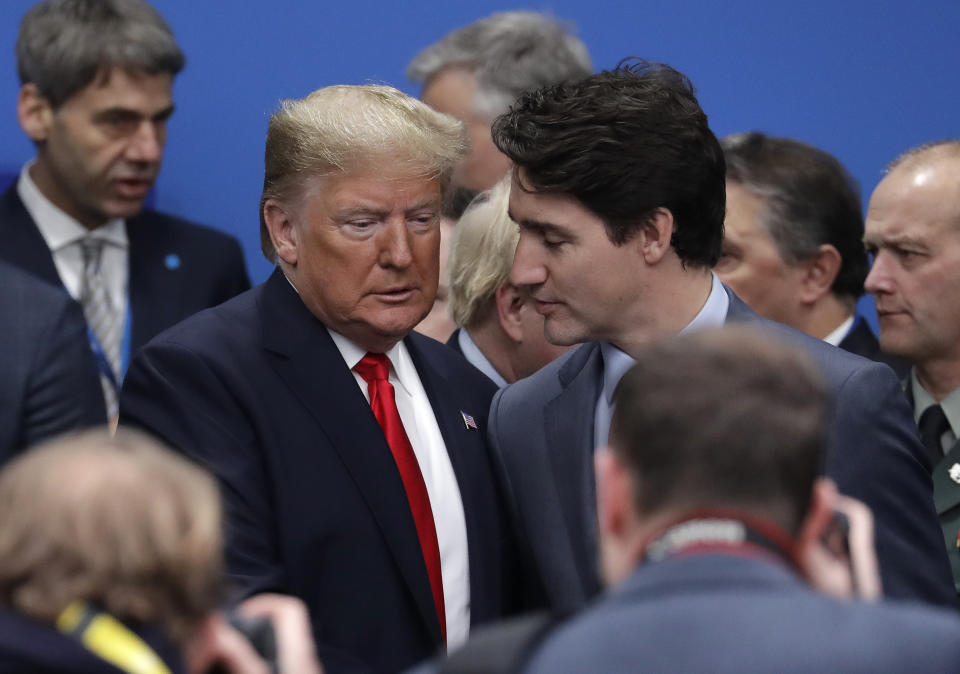Trudeau's lack of criticism of Trump draws ire online
It’s being called the pause heard across the country.
When asked about the use of military force against people protesting racial injustice and police brutality in the U.S., Prime Minister Justin Trudeau took about 20 seconds before attempting to answer the question. He was careful not to directly denounce President Donald Trump nor his leadership.
"We all watch in horror and consternation at what is going on in the United States," he said. "It is a time to pull people together ... it is a time to listen. It is a time to learn, when injustices continue despite progress over years and decades."
When will @JustinTrudeau condemn @realDonaldTrump or my skin colour isn’t important to the @liberal_party #blacklivesmattercanada
— JamarTheGay🌈 (@JamarTheGay) June 2, 2020
Do you really think Trudeau should be the individual lecturing on systematic racism when he can't remember how many times HE wore #Blackface .....time that the media addresses this #Hypocrisy
— "MRH_1984" 🇨🇦 (@MRH_1984) June 2, 2020
@JustinTrudeau and @ElizabethMay have yet to call @realDonaldTrump out for his hatred of black people. If the @liberal_party and @CanadianGreens continue to avoid holding trump responsible then they are part of the problem #BlackLivesMatter #blacklivesmattercanada https://t.co/5prtjPJus5
— JamarTheGay🌈 (@JamarTheGay) June 2, 2020
And the Academy Award for the most faked dramatic pause in Canadian history goes to Crime Minister “Blackface” Justin Trudeau! 🤣🤣 what a joke of Canadian Politics! https://t.co/WfVdendu5a
— Geoff Buxcey (Ret. RCMP) (@geoff_buxcey) June 2, 2020
Always listen for "the pause." It is the sound of a speaker being politely but firmly dragged off script, and it is often where the magic happens. #Trudeau #journalism
— mllemarguerite (@mllemarguerite) June 2, 2020
Trudeau's play acting is obscene.
He's asked a hard question on racism & US. He does an extra super long dramatic pause & then a long halting thoughtful seemingly spontaneous answer.
Then he gives exact same answer in French.
This scripted daily play acting is BS. #JustinsJournos— Vitor Marciano (@Vitormarciano) June 2, 2020
Some felt that Trudeau’s response was a result of timidity in the face of an unpredictable leader, when there is so much to condemn during these historic days.
But one expert says that Canadian prime ministers have historically been in a difficult spot when it comes to criticizing the United States.
“Dealing with the 500-pound colossus to the south is always a bit of a challenge,” says Greg Anderson, a political science professor at the University of Alberta. “It’s always a bit of a dicey dance that Canadian prime ministers have with American presidents and the United States. Yet we can’t help but watch from here and want some kind of reaction from leadership.”

This touchy dynamic has played out several times in history. After Lester Pearson gave a speech in the U.S. that was critical of the Vietnam War, Lyndon B. Johnson reportedly grabbed him by the lapels and shouted "Don't you come into my living room and piss on my rug.”
When the Bush administration was contemplating going to war in Iraq, Jean Chretien’s government had a hard time deciding whether to participate. The Liberal government were unwilling to criticize American actions but didn’t want to get dragged in either.
Another reason Trudeau might be biting his tongue is because he doesn’t want to be the pot who calls the kettle black. Canada is still working at addressing active racism and police brutality throughout the country, as well as implementing the Truth and Reconciliation Commission.
“It’s not as if Canada is completely free of some of these social divisions” says Anderson. “What function would criticism of Trump serve in this context? There’s plenty of Americans doing that work for him. I don’t think he needs to complicate relations with the U.S. by openly criticizing the action of the U.S. President, since they speak for themselves.”
Trudeau did push back earlier this week after Trump proposed Russia’s inclusion in the G7, saying that the country shouldn’t be part of the meeting.
Anderson says when it comes to addressing these issues, it would make the most sense for Trudeau to make a general statement, and bring it back to the issues that are present in Canada.
“I don’t think Trudeau is dodging this,” he says. “I’m not sure what his responsibility to Canadians is in saying something specific about what’s going on in the United States.”

